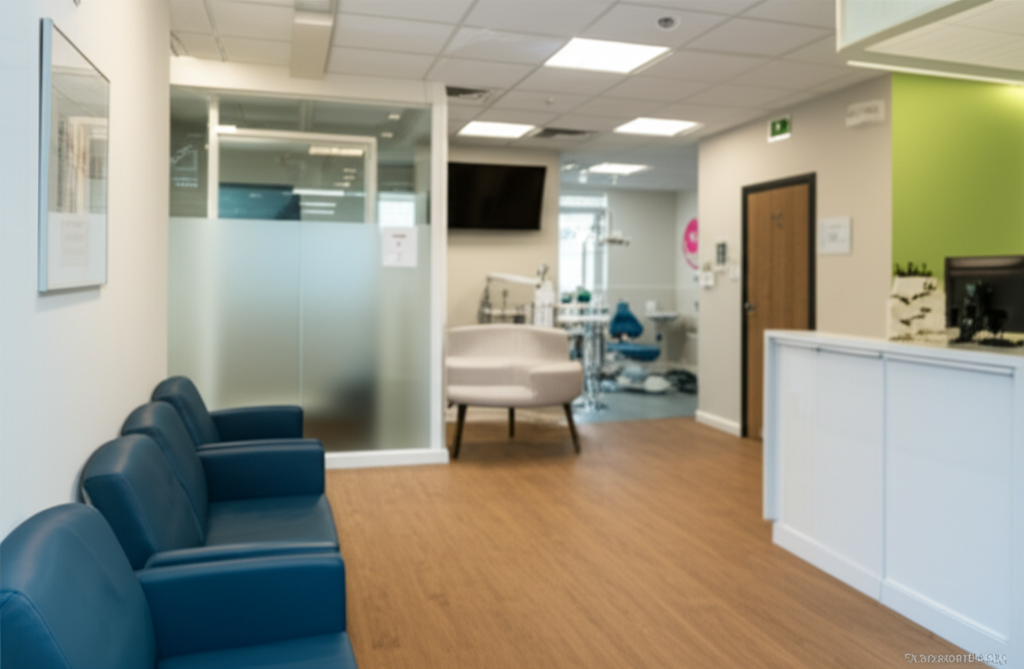
What is an NHS Dentist? Your Complete Guide to UK Dental Care
Table of Contents
1. Understanding NHS Dentistry: Definition and Core Principles
What ‘NHS Dentist’ Means in the UK
The first time I heard the term “NHS dentist,” I really wasn’t sure what made them different from any other dentist. If you’ve felt that way too, you’re not alone. To put it simply, an NHS dentist is just a dentist who is signed up with the UK’s National Health Service (NHS) to give care under NHS rules. This system helps people like you and me get important dental services at set, reasonable prices.
From my own experience as a dental patient and working near the field, I found out that not every dental clinic is an “NHS practice.” Some are just private, and others do a mix of NHS and private work. NHS dentists follow strict rules to make sure the care is the same no matter where you are — big city or countryside.
The Aims of NHS Dental Services: Accessibility and Affordability
Let’s be honest — the cost of dental work can be high. The NHS is there so that everyone, no matter how much money they make, can get basic dental help if they really need it. That means clear prices, standard treatments, and a focus on stopping problems before they start. I’ve seen family and friends benefit from this, especially if money is tight or if they have no private insurance.
How NHS Dentistry Differs From Private Dental Care (Key Distinctions)
When I compared NHS to private, three things really caught my attention:
- Pricing: NHS dental costs are set and the same everywhere. Private fees aren’t, and are usually higher.
- Treatment Scope: NHS covers what you need for your health. Private dentists can do more things, especially for looks, like teeth whitening or white fillings at the back.
- Access and Choice: With the NHS, you might have to wait longer or have less choice in who you see. Private offers more flexible booking, but it’s pricier.
Knowing the differences helps you pick what’s right for you.
2. What Treatments Are Covered by an NHS Dentist?
Focus on Clinically Necessary Treatments
The NHS does not pay for everything. The main idea is simple: NHS care pays for what you need to keep your mouth, teeth, and gums healthy, pain-free, and working well. Anything else is private.
Understanding NHS Dental Treatment Bands (Band 1, Band 2, Band 3 Explained)
The “Band system” can look confusing, but here’s the basics:
- Band 1 is for simple check-ups, X-rays, advice, cleanings, and tips on how to care for teeth.
- Band 2 gives you everything in Band 1, and also does fillings, root canals, and taking teeth out.
- Band 3 covers Bands 1 and 2 and adds things like crowns, dentures, and bridges.
The bands help you know what you’ll pay, so the price is always clear.
Common Treatments Covered: Check-ups, Fillings, Extractions, Root Canal, Crowns, Dentures
With the NHS, I’ve had:
- Regular check-ups (Band 1)
- Fillings and extractions for bad teeth (Band 2)
- Crowns and dentures for my family (Band 3)
Serious pain or swelling always gets looked at first — even if you’re not on their books yet.
Treatments Not Routinely Covered: Cosmetic Procedures, Implants (Generally)
If you want something just for looks — like tooth bleaching or white fillings on the very back teeth — you normally pay out of your own pocket. Implants and veneers aren’t usually offered either, unless there’s a rare, real health reason.
When I asked for a cosmetic fix, my NHS dentist was honest with me. I knew what to expect and could plan for it.
3. NHS Dental Charges: Costs, Exemptions, and Payments
The Current NHS Dental Charge Structure by Band
Talk about money — no one likes a surprise at the dentist. As of April 2024, the charges in England are:
| Band | What’s included | Cost |
|---|---|---|
| Band 1 | Exam, advice, clean, X-rays | £25.80 |
| Band 2 | Band 1 + fillings, root canals, extractions | £70.70 |
| Band 3 | Band 1 + 2 + crowns, dentures, bridges | £306.80 |
These prices are the same at every NHS dentist in England. Places like Scotland or Wales may be a bit different.
Who is Entitled to Free NHS Dental Treatment (e.g., Children, Pregnant Women, Low-Income)
Some people get NHS dental treatment free:
- Children under 18 (or 19 in full-time school)
- Pregnant women or new mums for up to a year after the baby’s born
- Those on certain benefits (like Universal Credit)
- People in hospital getting dental care
- Some NHS inpatients or people with certain long illnesses
Usually, you fill in a form to get free or cheaper treatment.
How to Pay for NHS Dental Treatment
Most places take card or cash. For big bills (like Band 3), some may let you pay in bits. Don’t be shy to ask about paying.
Understanding Prescription Charges for NHS Dental Prescriptions
Sometimes, dentists give you a prescription for antibiotics or pain medicine after your visit. In England, you pay the regular NHS prescription price (£9.65 per item). In Wales, these are free.
4. How to Find and Register with an NHS Dentist
Using the NHS.uk Website to Find a Dentist Near You
When I moved to a new town, I worried, “How do I find an NHS dentist near me?” It turned out to be simple. The NHS.uk website lets you type in your postcode and shows nearby NHS dental practices.
The Registration Process: What to Expect and What Information You’ll Need
Signing up with an NHS dentist is usually easy. You don’t need a letter from your doctor. When you call or visit, you fill out a simple form — just your name, contact details, and sometimes your NHS number (which can be found on past paperwork or online).
Once you’re registered, you book your first check-up. Bring some ID and proof if you get free treatment.
What to Do If You Can’t Find an NHS Dentist Accepting New Patients
Not every dentist has space right away, especially for new adults. There can be waiting lists, and sometimes it takes a while. If so, ask to be put on the list, and keep checking every few months. Sometimes, it just takes time and patience.
You can also call NHS 111 for advice — they helped me out once. They’ll point you to the nearest place with openings, or tell you what to do if you’re in pain now.
Changing Your NHS Dentist
Need to move? Old dentist stopped? Or do you just need a new dentist? You can swap NHS dentists whenever you want — just sign up at a new place. No charge, no need for a letter; but it might take some time for your dental records to arrive.
5. Accessing NHS Dental Care: Appointments, Waiting Lists, and Emergencies
Booking Regular Check-ups and Follow-up Appointments
NHS practices like you to pop in for check-ups (usually every 6–12 months). After your visit, they’ll tell you when to come back. Demand can be high, so book early if you can.
Understanding NHS Dental Waiting Lists and Appointment Availability Challenges
The hard truth: getting an NHS dentist’s appointment isn’t always quick or easy. In some areas, only 20–30% of practices have space for new adults at a time. You might get in quick, or sometimes wait months or even years. Try being flexible or looking a bit further out to get seen sooner.
Urgent and Emergency NHS Dental Care: How to Access Help When You Need It
Got sudden pain, broken tooth, or swelling? Don’t wait. NHS 111 is where I’ve turned when it’s urgent. They’ll point you to an emergency dentist or sometimes to hospital care if it’s after hours.
What to Expect During Your NHS Dental Appointment
At your NHS dental visit, expect the dentist to be calm and professional. They’ll explain what needs doing and what it costs, and you can ask questions. Bigger jobs might get a printout explaining the plan before they start.
6. Benefits and Limitations of NHS Dental Services
Advantages: Affordability, Standardised Care, Focus on Oral Health
Thanks to the NHS, people don’t have to pick between being healthy and being able to pay the bills. The band costs make things straightforward. When I was short on money, knowing the NHS was there really helped me sleep better at night.
The focus on “necessary” treatment is meant to keep everyone healthier, with more advice about keeping problems away.
Disadvantages: Limited Treatment Options, Potential Waiting Times, Less Choice of Materials
The NHS can’t do everything. Want fancy work or top materials? You may need to go private. Like, back tooth crowns are metal on NHS, but you can pay private for all-ceramic. Sometimes, waiting for a spot tries your patience.
A dentist friend – and Dr. Joe Dental, someone I trust – both say these limits are to make sure as many people as possible get help, with the money the system has.
Quality of Care: Addressing Common Concerns
People sometimes worry “NHS” means “not as good.” But from what I’ve seen, that’s just not true. NHS dentists have to stick to strict rules and get checked often. The General Dental Council keeps an eye on them, and about 75–85% of patients are happy with their care.
7. Patient Rights, Complaints, and Further Information
Your Rights as an NHS Dental Patient
As an NHS dental patient, you’re protected by NHS rules and the Patient Charter. You should get:
- Clear details about costs and treatments
- Respect for your needs
- The chance to ask questions and help decide what to do
- The right to complain if you’re not happy
How to Make a Complaint About NHS Dental Treatment
If something’s gone wrong, speak up. Try talking to the practice manager first; most things get fixed right away. Still not happy? You can go to the local NHS England team or the Parliamentary and Health Service Ombudsman. The NHS website explains the steps clearly.
Useful Resources: NHS.uk, British Dental Association (BDA), General Dental Council (GDC)
Some official sites I trust for good advice:
- NHS.uk: Patient guides, emergency care, info on free treatment.
- British Dental Association (BDA): Dentist info and news.
- General Dental Council (GDC): Checking dentist qualifications and rules.
8. NHS Dentist FAQs (Frequently Asked Questions)
Is NHS dental care completely free?
No, not for adults. Kids, pregnant women, and some people on benefits get free care. Most adults pay the fixed Band prices.
Can I get white fillings on the NHS?
Yes — but usually just on front teeth. If you want white fillings at the back just because of how they look, you’ll usually have to pay privately.
How often should I see an NHS dentist?
Your dentist will say, but usually every 6–12 months. I go every six months, just to catch problems before they get worse.
What if I miss an NHS dental appointment?
Life happens. If you miss or last-minute cancel more than once, you might lose your spot. Always ring in as early as you can if you need to cancel.
Can an NHS dentist refuse treatment?
Yes, but only with a reason – for example, if the treatment is just cosmetic or isn’t safe. If you don’t agree, you can get another opinion or make a complaint.
9. Conclusion: Navigating Your NHS Dental Journey
Summary of Key Takeaways
My time with NHS dental care has shown me that, while not perfect, the system lets millions get basic dental help at a price they can handle. Knowing how the charge bands work, what’s covered (and what’s not), and how to sign up makes it easier to make good choices.
Empowering Patients With Information for Better Oral Health
The best weapon against dental problems is knowledge. Speak up, ask questions, and use proper resources. Whether you’re weighing up NHS and private, searching for a “dentist near me NHS,” or trying to get free care, you’re not alone.
If your treatment needs things like crowns or dentures, NHS dental practices often work with special labs, just like you’d find at a top crown and bridge lab or removable denture lab, to make sure your care is up to scratch.
Take care of your teeth, look after them early, and remember — if you ever feel lost in the dental world, there’s always someone ready to help.
Professionally reviewed by Dr. Joe Dental, NHS and private practice advisor.
This article is based on my own experience, current NHS policy, and best advice from UK dental groups in 2024.








